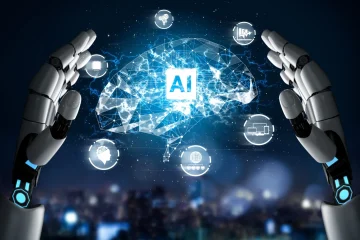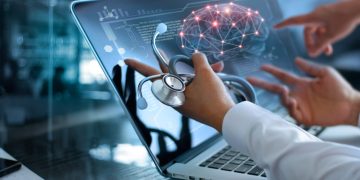The Impact of Artificial Intelligence on Modern Healthcare

Artificial Intelligence (AI) is revolutionizing the healthcare industry, bringing about significant advancements in diagnosis, treatment, patient care, and operational efficiency. From predictive analytics to personalized medicine, AI is enhancing outcomes for patients and healthcare providers alike. This article delves into the transformative role of AI in modern healthcare and its implications for the future.
1. AI in Medical Diagnostics
AI-powered tools are proving invaluable in diagnosing diseases with remarkable speed and accuracy. Algorithms trained on vast datasets can analyze medical images, lab results, and patient histories to identify conditions earlier than traditional methods.
Key Applications:
- Radiology: AI tools detect abnormalities in X-rays, MRIs, and CT scans, such as tumors or fractures, with high precision.
- Pathology: AI enhances the examination of tissue samples, aiding in cancer detection and other conditions.
- Cardiology: AI systems analyze ECGs and echocardiograms to diagnose heart conditions quickly.
2. Personalized Medicine and Treatment
AI enables a tailored approach to medicine by analyzing individual genetic profiles, lifestyle factors, and medical histories. This ensures patients receive treatments that are most effective for their unique needs.
Examples of Impact:
- Drug Development: AI accelerates the discovery of new drugs by predicting how compounds will interact with biological systems.
- Genomic Analysis: AI helps identify genetic mutations linked to diseases, paving the way for personalized therapies.
- Chronic Disease Management: AI-driven insights assist in crafting individualized care plans for conditions like diabetes and hypertension.
3. Enhancing Patient Care
AI is reshaping how healthcare providers interact with patients, offering tools that improve communication, efficiency, and overall experience.
Improvements in Care:
- Virtual Health Assistants: AI chatbots and voice assistants answer patient queries, schedule appointments, and provide medication reminders.
- Telemedicine: AI-powered platforms facilitate remote consultations, especially crucial in rural or underserved areas.
- Wearable Devices: Smartwatches and fitness trackers with AI analyze health data in real-time, alerting users to potential issues.
4. Predictive Analytics in Healthcare
By analyzing historical data, AI predicts trends and outcomes, enabling proactive decision-making.
Applications:
- Disease Outbreaks: AI monitors global health data to predict and prevent disease outbreaks.
- Hospital Operations: Predictive tools optimize staffing, reduce patient wait times, and improve resource allocation.
- Risk Assessment: AI identifies patients at high risk for conditions like strokes or sepsis, enabling timely intervention.
5. AI in Mental Health
AI applications are helping bridge the gap in mental healthcare by offering tools for early detection, therapy, and ongoing support.
Key Contributions:
- Mood Analysis: AI algorithms detect signs of depression or anxiety through voice tone, facial expressions, or social media activity.
- Cognitive Behavioral Therapy (CBT): AI-driven apps provide CBT exercises and coping mechanisms for patients.
- Suicide Prevention: Predictive AI tools identify individuals at risk and alert healthcare professionals for timely action.
6. AI in Surgical Procedures
Robotics powered by AI are transforming the field of surgery, ensuring precision and reducing recovery times.
Innovations in Surgery:
- Robot-Assisted Surgeries: Systems like the da Vinci Surgical System perform complex procedures with minimal invasiveness.
- Preoperative Planning: AI simulates surgeries to prepare surgeons for the best outcomes.
- Postoperative Monitoring: AI tools track patient recovery, alerting doctors to complications early.
7. Ethical and Regulatory Challenges
Despite its potential, AI in healthcare poses ethical and regulatory challenges that must be addressed.
Considerations:
- Data Privacy: Ensuring patient data security is paramount as AI relies on sensitive information.
- Bias in Algorithms: AI models trained on biased datasets can perpetuate healthcare disparities.
- Regulatory Oversight: Governments and institutions must establish clear guidelines for AI implementation to ensure safety and efficacy.
8. The Future of AI in Healthcare
The integration of AI into healthcare is still in its early stages, but the potential for growth is immense. Emerging technologies like natural language processing (NLP) and advanced robotics are poised to further enhance care.
Looking Ahead:
- Global Health Equity: AI can bridge gaps in access to quality care, especially in developing nations.
- Integrated Healthcare Systems: AI will play a central role in creating seamless systems connecting patients, providers, and payers.
- Lifelong Health Monitoring: AI will enable continuous health tracking, moving healthcare from a reactive to a proactive model.
Conclusion
Artificial Intelligence is a game-changer in healthcare, driving innovations that save lives, improve patient outcomes, and optimize resources. While challenges exist, the continued collaboration between technologists, healthcare providers, and policymakers will ensure AI’s integration remains ethical, equitable, and transformative. As we move forward, AI’s potential to redefine healthcare is boundless, offering hope for a healthier and more accessible future.




















